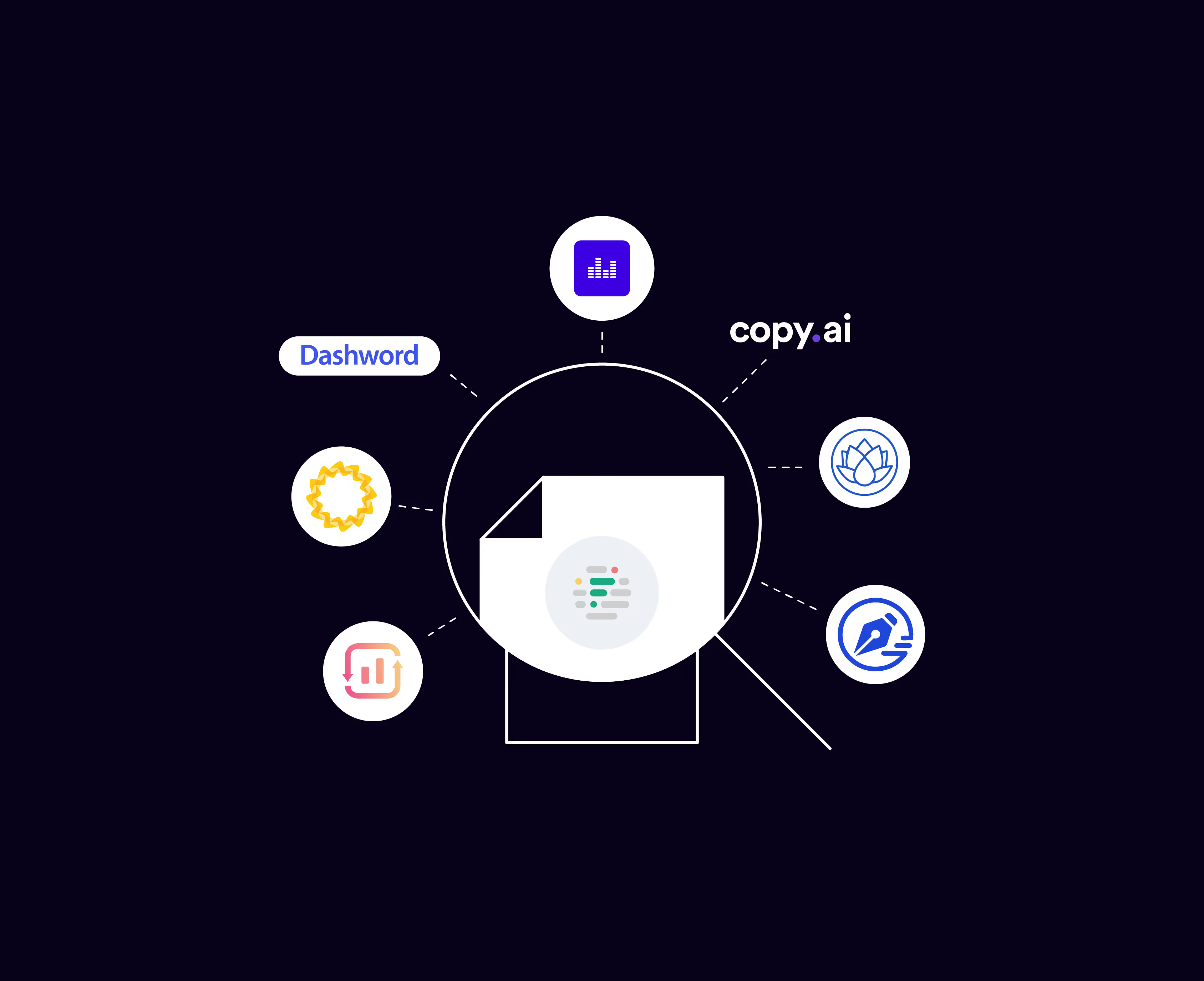Frase is primarily a content optimization tool designed to help creators and marketers improve their content’s SEO (search engine optimization). Its core function is optimizing existing content, but it has a suite of features that extend beyond this, including content brief creation, outlining, and AI content generation.
Frase’s features are broken down into key steps in the writing process:
- Research: Aggregates data from top-ranking pages for your target keywords and provides key insights into those pages’ content structure, word count, and potential topics.
- Outline: Creates AI-powered outlines based on top-performing content — you can rearrange elements for better flow.
- Write: Generates AI-assisted articles with paragraph and section rewrites.
- Optimize: Compares your content with that of top-ranking competitors, suggests relevant keywords and topics, and scores content.
But Frase isn’t the only player in town. We’ve tried and tested a handful of Frase alternatives to determine each one’s best features and the use cases it’s best suited to. Some match Frase feature for feature, while others bring something unique to the table.
1. Optimize by Positional
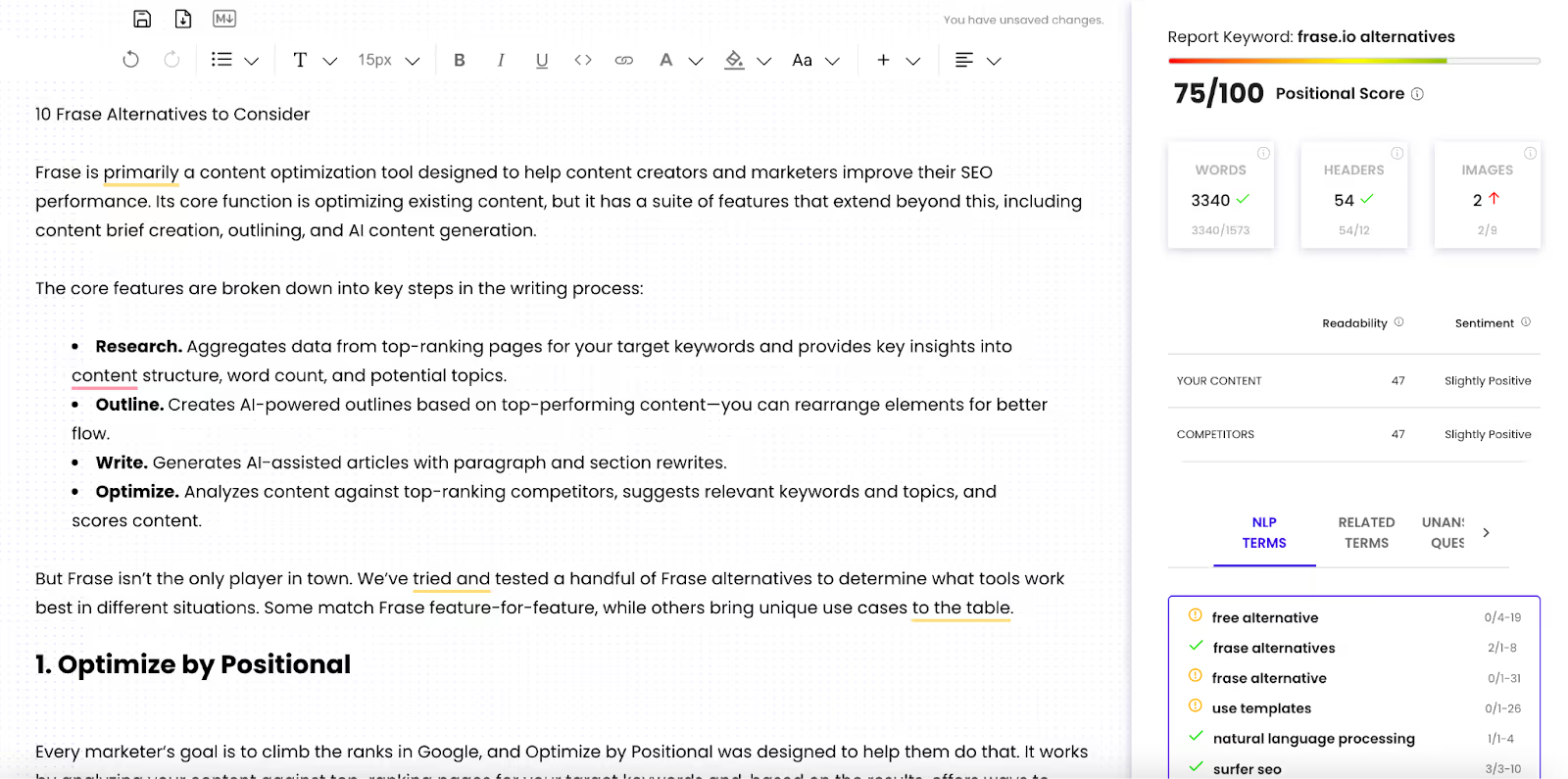
Every marketer’s goal is to climb higher on SERPs (search engine results pages), and Optimize by Positional was designed to help them do that.
It works by analyzing your content, comparing it with top-ranking pages for your target keywords, and, based on that analysis and comparison, offering ways to improve it. The tool uses natural language processing (NLP) and machine learning to pinpoint content gaps and opportunities to make sure your pieces are exactly what search engines are looking for.
Optimize’s Features vs. Frase’s Features
- Content Analysis: Like Frase, Optimize compares your content against that of top-ranking competitors to provide detailed insights. You can get real-time suggestions about what you can improve.
- Keyword Recommendations: Get suggestions for relevant keywords you should include in your content to improve SEO.
- Content Scoring: Optimize gives each piece of content a score based on how it measures up to SEO best practices and other, similar articles. This is a bit like Frase’s content grading feature.
- Competitor Analysis: Analyze your competitors’ content to better understand what makes the top-ranking pieces so successful (and get ideas for your own pieces).
- Outline and Structure Suggestions: Get recommendations for improving the structure of your pieces and making sure they are well organized and useful.
One of Optimize’s standout features is its integration with Google Docs. This lets you access optimization suggestions and make changes directly within your Google Docs — particularly useful for teams that collaborate on content creation in the Google ecosystem.
Pros:
The first thing I noticed about Optimize is how easy it is to use. The interface is really simple, and there are very few distractions. You have your content block to the left and your content score and suggested keywords to the right. The Google Docs integration is a huge bonus, as it allows you to work in a Google Doc without having to copy and paste text into the tool.
One of my favorite things about Optimize is how it emphasizes readability. Many of the tools on this list are strict about how keywords are included in a piece and force writers to use weird keyword variations that sometimes make a piece of content read less well. Optimize doesn’t do this — you don’t have to jump through hoops to get a good score. It focuses on the most important keywords and topics.
Cons:
There aren’t many downsides to Optimize. When you use it alongside other Positional tools, like Competitor Research and Keyword Research, you can start forming a pretty clear picture of what good content looks like. If I had to pick something, though, it would be the limited integrations. While I have a relatively lean tech stack as a writer, marketers with more complex needs might struggle with how few integrations there are.
How Does Pricing Work?
Positional offers several pricing plans based on which features you want:
- Lite (includes Optimize): $79 per month.
- Base: $249 per month.
- Growth: $399 per month.
Best For:
Content marketers, SEO professionals, bloggers, freelance writers, and marketing teams.
2. Surfer
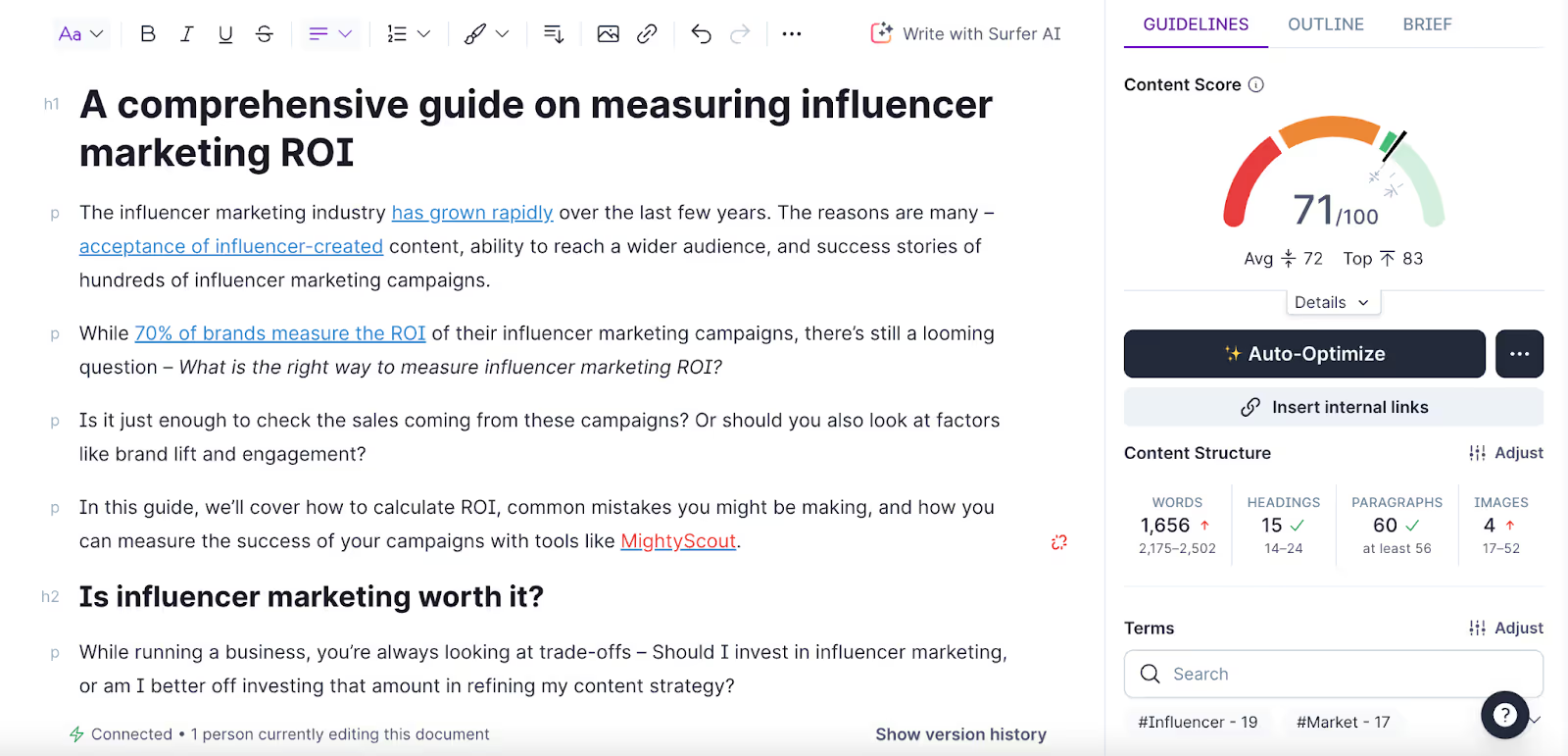
Surfer works by analyzing more than 500 on-page signals and comparing them with those of top-ranking pages for your target keywords. It then gives you actionable recommendations for improving your content so it competes with the top posts.
Surfer Features vs. Frase Features
- Content Editor: Surfer's Content Editor provides real-time feedback on your content's optimization status, similar to Frase's content grading. It suggests optimal word count, keyword usage, and other SEO elements.
- SERP Analyzer: It analyzes SERPs to identify what makes top-ranking content successful, similar to Frase’s competitive analysis.
- Keyword Research: Get insights into keyword opportunities — however, Frase is better at topic clustering and content brief creation.
- Audit Tool: Analyzes existing content and provides recommendations for improvement.
- Content Planner: Surfer can help you plan content strategies by identifying clusters and gaps.
Pros:
Surfer offers actionable data for content creators, and it’s laid out in an easy-to-understand way. You can see your content score increase or decrease in real time while you edit in the app. I particularly like the way the keyword phrases turn from red to orange to green to indicate how many times they’ve been used in a piece.
Cons:
Trying to get the content score into the green can sometimes feel like hard work. You have to include most of the top 10 suggestions to have any impact on your score.
How Does Pricing Work?
Surfer offers several pricing plans based on usage needs:
- Essential: $89 per month.
- Scale: $129 per month.
- Scale AI: $219 per month. Custom enterprise plans are also available.
Best For:
Content marketers and writers, SEO professionals, agencies, and small businesses.
3. Clearscope
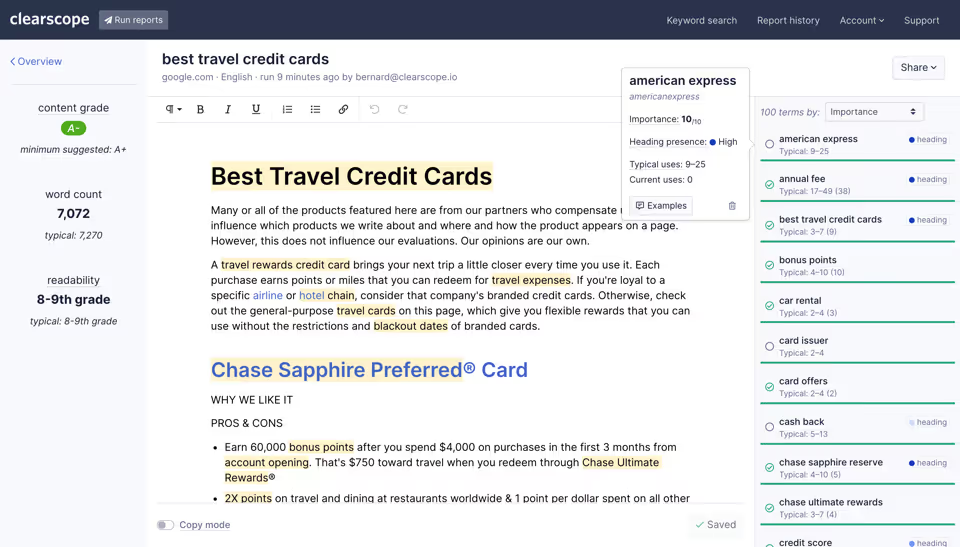
Clearscope uses AI and NLP to analyze top-ranking content and provide data-driven recommendations. It was designed to help writers and marketers optimize their content for search engines and search intent.
Clearscope Features vs. Frase Features
- Content Reports: Clearscope runs detailed analyses. It uses the results to offer keyword suggestions, including how many times you should use each keyword in your piece of content.
- Keyword Discovery: Identifies relevant keywords and phrases to include in your content, much like Frase’s keyword suggestion feature.
- Content Grading: Articles receive a content score based on how well they align with SEO best practices.
- Real-Time Feedback: Clearscope integrates with Google Docs and WordPress for real-time optimization suggestions — something Frase doesn’t do.
While Frase and Clearscope have similar features, Clearscope focuses more on readability metrics (like reading level). It doesn’t offer any AI writing capabilities, but it does have a content inventory feature that allows you to track your overall content performance.
Pros:
I particularly like Clearscope’s readability scores. As a writer, I’m often concerned with how a piece reads, not just how many keywords it hits, so this is a nice addition. The tool is also pretty simple to use.
Cons:
Clearscope is a little pricier than some of the other Frase alternatives on this list. Its features are comprehensive, but it doesn’t offer much more than the other tools here, and you have to pay more.
How Does Pricing Work?
Clearscope has a tiered pricing model:
- Essentials: $189 per month.
- Business: $399 per month. There are also enterprise custom pricing plans.
Best For:
SEO agencies managing multiple clients, experienced content creators who want data-driven insights, and brands that already have a content creation process in place but are looking to optimize further.
4. MarketMuse
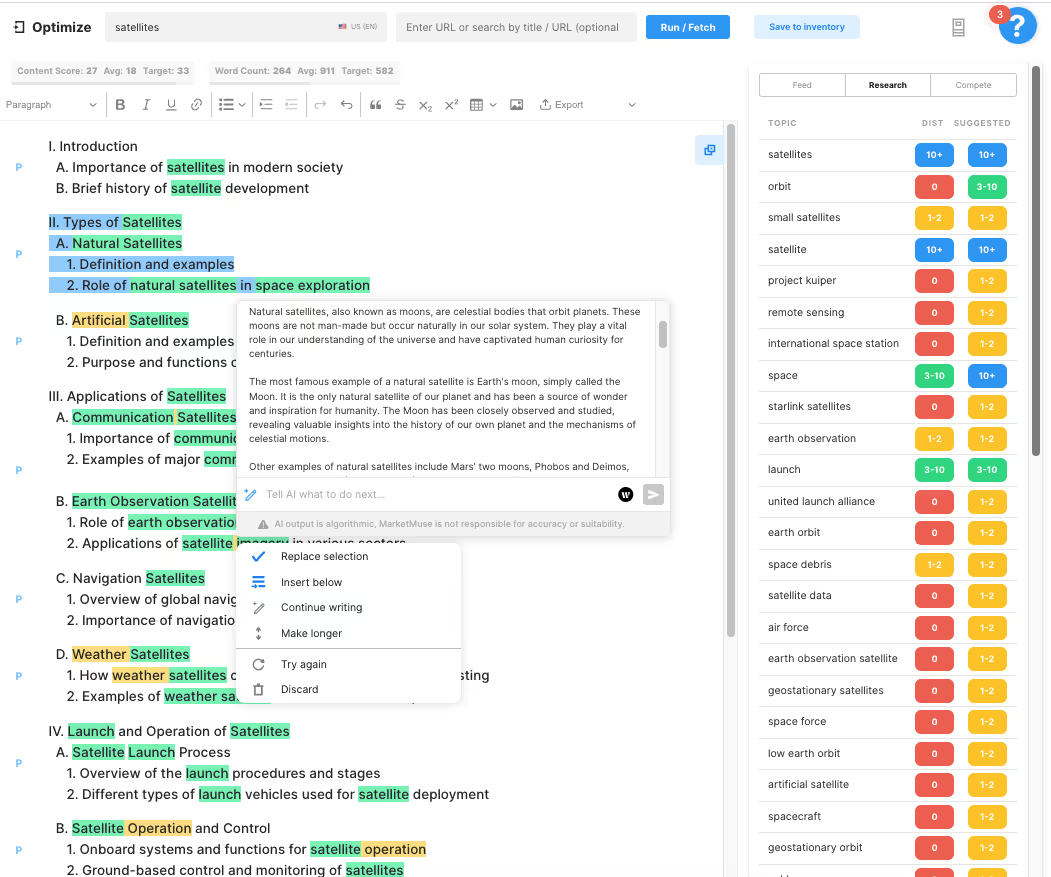
MarketMuse automates the content auditing and optimization process to show you what’s working and what’s not. It uses AI-driven content research and machine learning to analyze huge amounts of top-ranking data, so you can see where your content falls short and identify keyword opportunities.
MarketMuse Features vs. Frase Features
- Content research: MarketMuse is particularly good at in-depth topic research and finding content gaps.
- Content briefs: Generates detailed content briefs just like Frase’s content brief creator does.
- Content optimization: Provides recommendations for improving content relevancy and SEO performance.
- Competitive analysis: Analyzes competitor content to find where your strengths and weaknesses are. It then makes suggestions based on the results of that analysis.
- Content strategy: It provides a suite of tools that can help you develop comprehensive content strategies — an area where Frase falls short.
MarketMuse has personalized difficulty scores for ranking, unlike Frase, but it doesn’t have an AI writing tool.
Pros:
MarketMuse goes beyond optimization and actually helps you map out an entire content strategy. The personalized content scores are particularly useful for understanding what you need to improve and getting some quick wins.
Cons:
Because it’s more of a full content strategy solution, MarketMuse is pricier than some of the other tools here. Also, the sheer number of features can be overwhelming for smaller teams or individual content creators.
How Does Pricing Work?
MarketMuse offers various pricing plans:
- Standard plan: $149 per month.
- Team plan: $399 per month. There are also custom plans for large teams.
Best For:
Content strategists, large businesses, and agencies — basically, companies that have the resources to afford and take advantage of its advanced features.
5. seoClarity
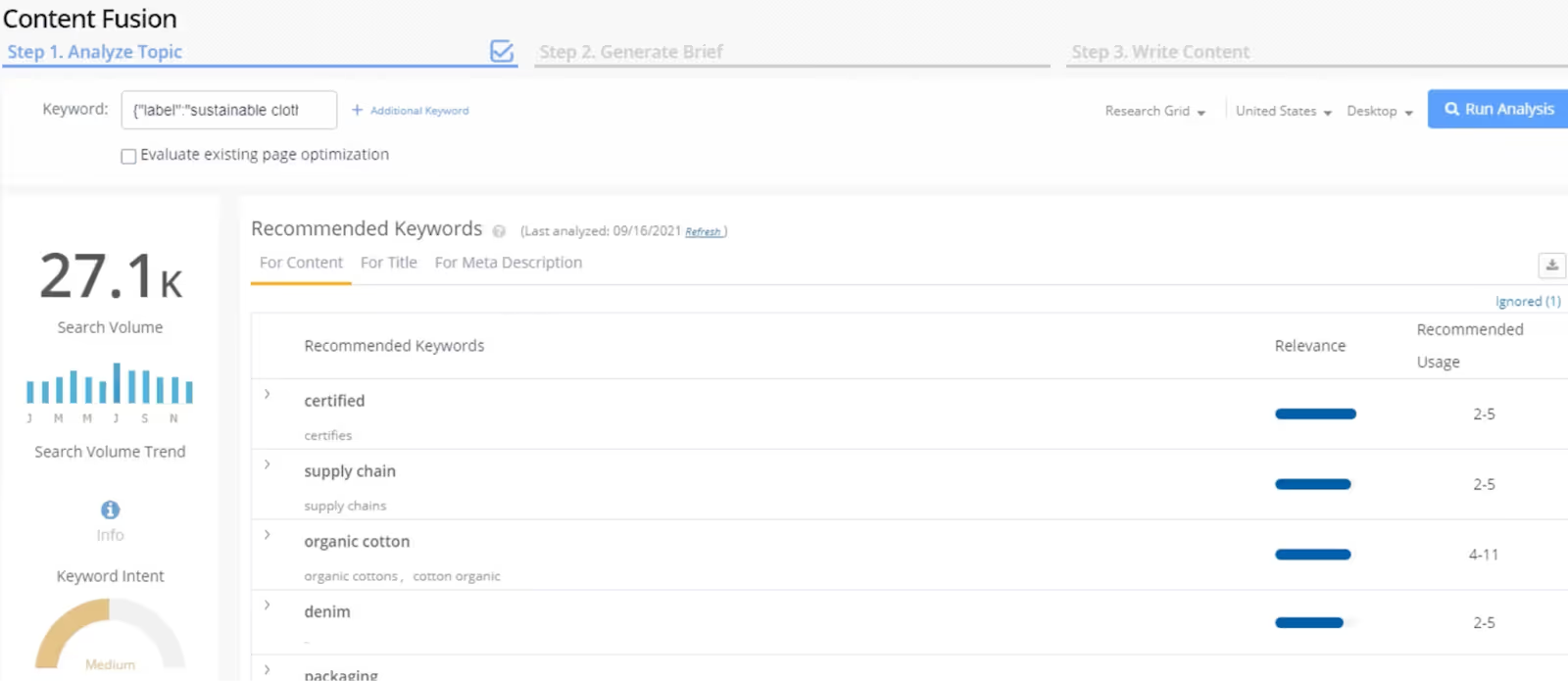
seoClarity is an all-in-one SEO platform that goes beyond content optimization. It has a range of tools for keyword research, site audits, and rank tracking, and it uses AI and machine learning to deliver real-time recommendations.
seoClarity Features vs. Frase Features
- Keyword research. seoClarity has extensive keyword research capabilities, similar to Frase’s keyword suggestions.
- Content optimization. The Content Fusion tool provides recommendations to improve content for SEO purposes.
- Rank tracking. Tracks keyword rankings and performance — something Frase doesn’t do.
- Site audits. Carries out comprehensive site audits to identify technical SEO issues.
- Competitive analysis. Analyzes competitor strategies and performance, similar to Frase’s competitive analysis.
seoClarity has a much broader toolkit than Frase, as well as rank tracking and SERP analysis. It also offers technical SEO auditing, but it doesn’t have a built-in AI writing tool.
Pros:
Because seoClarity is a comprehensive tool and not just a content optimization tool, it comes with a whole range of additional features and capabilities. The rank tracking and SERP analysis features are particularly useful for monitoring your performance on Google.
Cons:
It’s no surprise that seoClarity comes with a higher price tag than standalone, specialized tools. And while you do get access to a ton of features, they can be overwhelming and too complex for small teams or people who are new to optimization.
How Does Pricing Work?
- Essential: Custom pricing.
- Core plan: Starts at $2,600 per month.
- Professional plan: Starts at $3,600 per month.
Best For:
Large enterprises with complex SEO needs, agencies that manage multiple high-profile clients, and organizations with dedicated SEO teams. It’s particularly valuable for companies that need an all-in-one SEO solution rather than just a content optimization tool.
6. Content Harmony
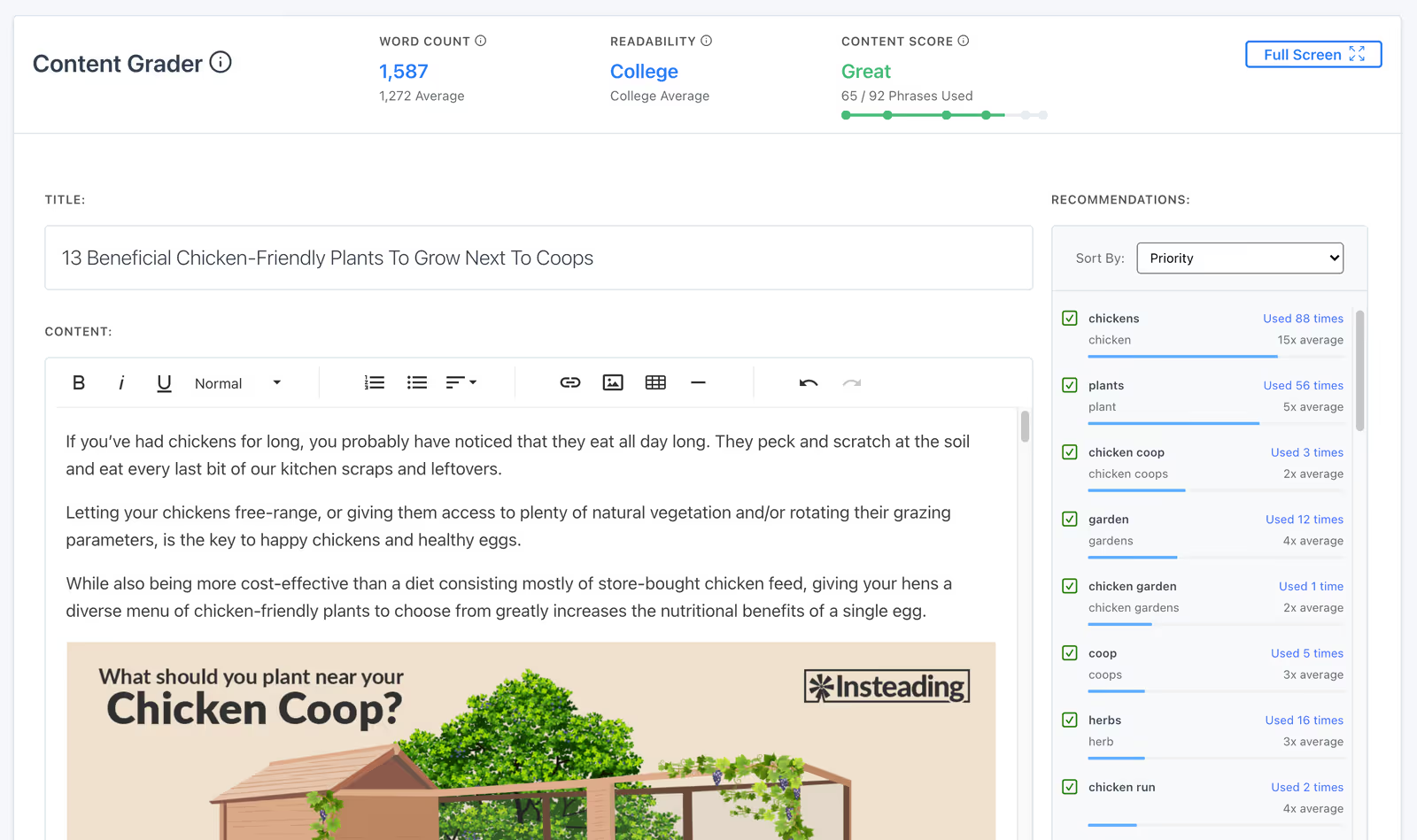
Content Harmony helps improve your content so it ranks better on SERPs. It has features that analyze your content and suggest ways to make it better — by targeting important keywords and following SEO guidelines.
Content Harmony Features vs. Frase Features
- Content briefs: Generates SEO-focused content briefs that outline what to cover in your articles.
- Keyword analysis: Offers detailed keyword insights, including search volume, difficulty, and related terms.
- Content optimization: Provides recommendations for how to improve your content for better readability and SEO.
- Competitor analysis: Compares your content with that of top-ranking competitors, identifying gaps and opportunities.
- Performance tracking. Monitors how your content performs over time, offering insights into traffic and ranking improvements.
The biggest difference between Content Harmony and Frase is that Content Harmony focuses more on detailed competitor analysis and performance tracking.
Pros:
The competitor analysis feature is pretty good and helps you look at how your content stacks up against the competition’s. It’s also pretty straightforward to use and provides clear, actionable tips for improving content.
Cons:
Compared with Frase’s, Content Harmony’s integrations with other platforms are somewhat limited. This is fine if you’re happy optimizing your content in-app, but a bit frustrating if you’d rather not keep copying and pasting text.
How Does Pricing Work?
Prices range from $50 to $799 per month, depending on how many pieces of content you want to optimize.
Best For:
Content writers, small to medium-sized businesses who need a cost-effective solution, and SEO professionals who want to track content performance over time.
7. Dashword
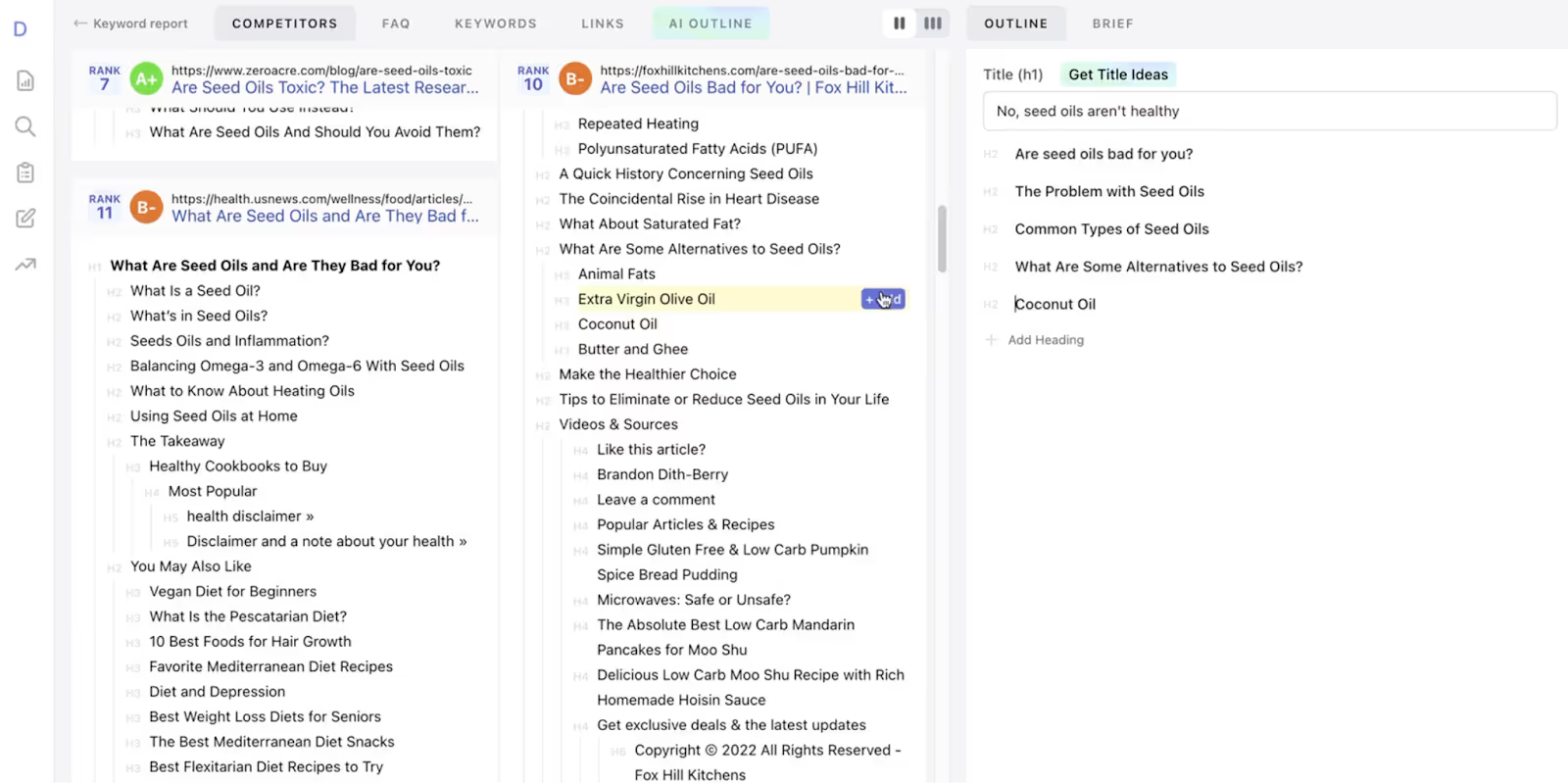
Dashword creates content briefs and optimizes your content to help you publish SEO-friendly content that performs well. It works by analyzing your content and providing suggestions based on target keywords and existing top-ranking posts.
Dashword Features vs. Frase Features
- Content briefs: Creates outlines for your articles with important points to cover.
- Keyword analysis: Shows you which keywords to use and how often to use them.
- Content optimization: Provides tips to make your content better for readers and search engines.
- Competitor analysis: Compares your content with top-ranking articles to see what you can improve.
- Real-time feedback: Gives you instant suggestions as you write or edit your content.
Dashword focuses more on real-time feedback and simple, straightforward advice, whereas Frase offers more advanced features.
Pros:
The real-time feedback is really useful for making quick improvements as you write, and it’s easy to see how your content compares to others’.
Cons:
While Dashword is easy to use, it’s missing some of the advanced features that the other tools have here — this is reflected in the price, though, so it’s not a huge downside.
How Does Pricing Work?
Dashword offers several pricing plans:
- Startup: $99 per month
- Business: $349 per month
Best For:
Content writers and bloggers, small businesses, and SEO beginners who need straightforward advice.
8. WriterZen
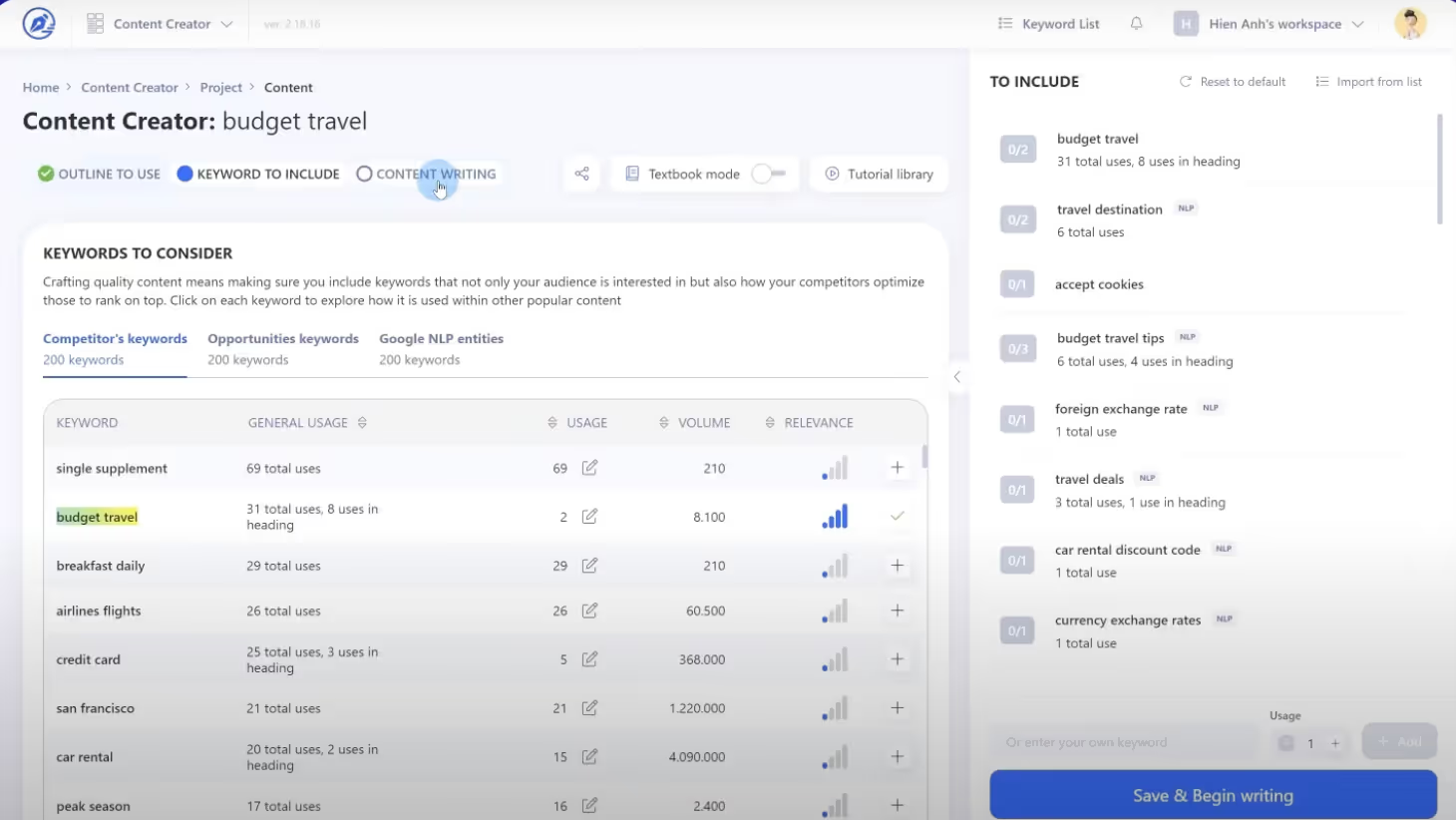
WriterZen is a content creation tool that has an optimization feature. You can compare your content with top-ranking posts to see how you match up and get recommendations for improving your pieces.
WriterZen Features vs. Frase Features
- Keyword explorer: Helps you find the best keywords to use in your content.
- Topic research: Provides ideas and outlines, based on popular topics and trends, for your articles.
- Content creator: Helps you write and optimize your content with real-time suggestions.
- Plagiarism checker: Ensures that your content is original and not copied from other sources.
- AI writing assistant: Offers AI-generated content to help you get started or improve your writing.
WriterZen includes a built-in plagiarism checker and focuses heavily on topic research and content ideas.
Pros:
WriterZen’s price is very attractive. Users pay a one-time fee to unlock multiple content audits and briefs each month. The topic idea generator is also super handy, providing tons of inspiration for new articles.
Cons:
While the AI-writing portion of WriterZen is emphasized a lot, it can sometimes be too basic. You might find yourself carrying out extensive edits more often than you’d like.
How Does Pricing Work?
WriterZen offers different pricing plans:
- Keyword research: $135 one-time fee.
- All-in-one basic: $270 one-time fee.
- All-in-one advanced: $406 one-time fee.
They also offer a seven-day free trial so you can test out the features before committing to a subscription.
Best For:
Content writers and bloggers, small businesses, and SEO professionals who need detailed keyword research and plagiarism checking.
9. Copy.ai
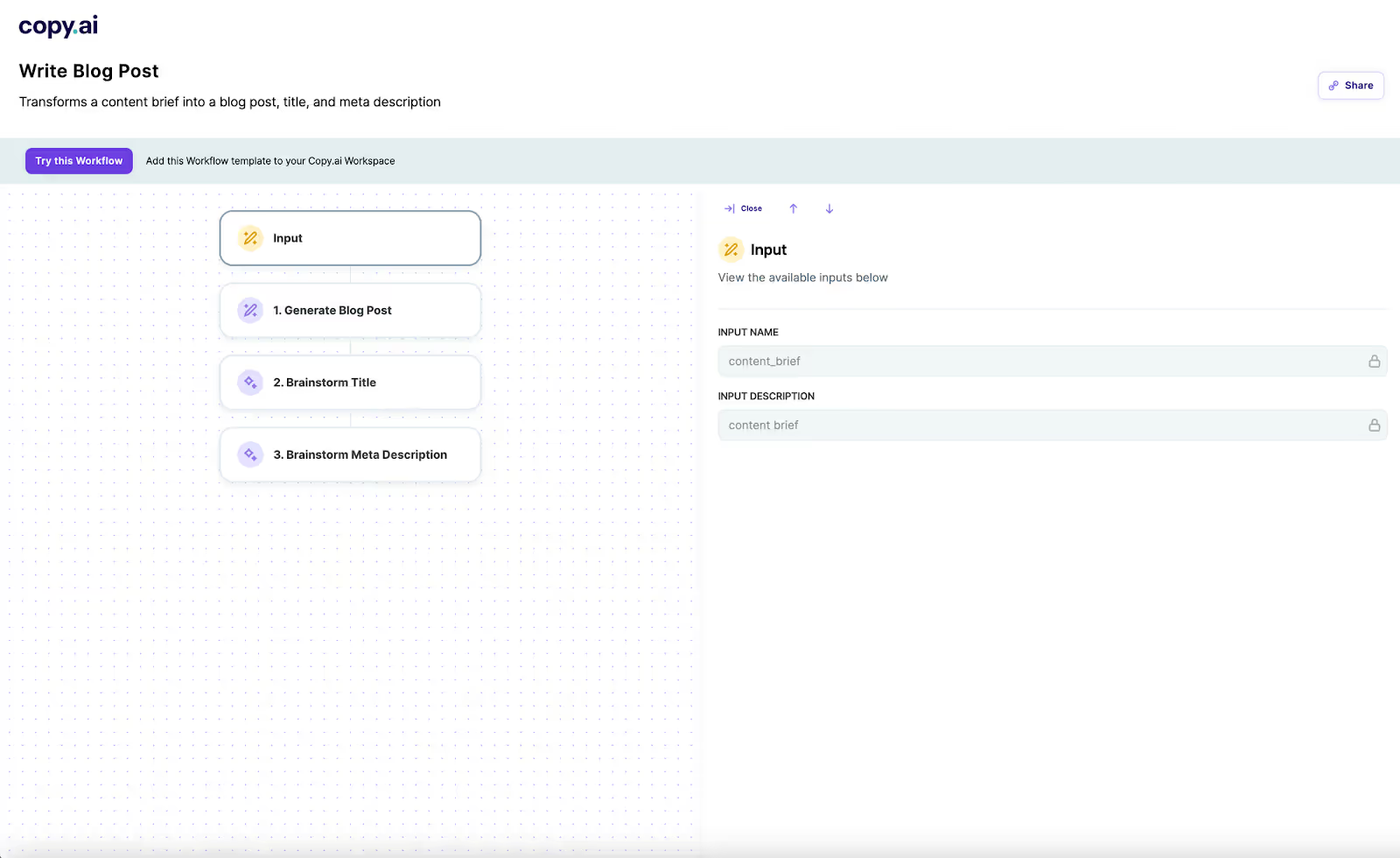
Copy.ai is an AI-powered tool that helps you build an SEO content creation workflow at scale. It analyzes existing content based on your keywords, creates detailed outlines, and optimizes the end result to give you the best chance of ranking.
Copy.ai Features vs. Frase Features
- Content generator: Quickly creates text for various types of content.
- Templates: Provides ready-made templates for different kinds of writing, like emails, ads, and product descriptions.
- Customization: Lets you adjust the tone and style of the generated content.
- Multilingual support: Can create content in multiple languages.
- Idea generator: Offers suggestions and ideas for new content.
Copy.ai focuses on quickly generating various types of content, while Frase offers deeper SEO analysis and content optimization features.
Pros:
There’s no doubt that Copy.ai can generate content fast. It can save a lot of time, and the templates make creating different types of content easy.
Cons:
Sometimes the generated content needs a lot of editing to make it sound right, and it doesn’t offer much in terms of SEO optimization, compared with the other tools here.
How Does Pricing Work?
Copy.ai offers several pricing plans:
- Free: Includes basic features and limited usage.
- Starter: $36 per month.
- Advanced: $186 per month.
Best For:
Content creators, marketers, and small business owners who need to generate lots of content quickly.
10. ChatGPT
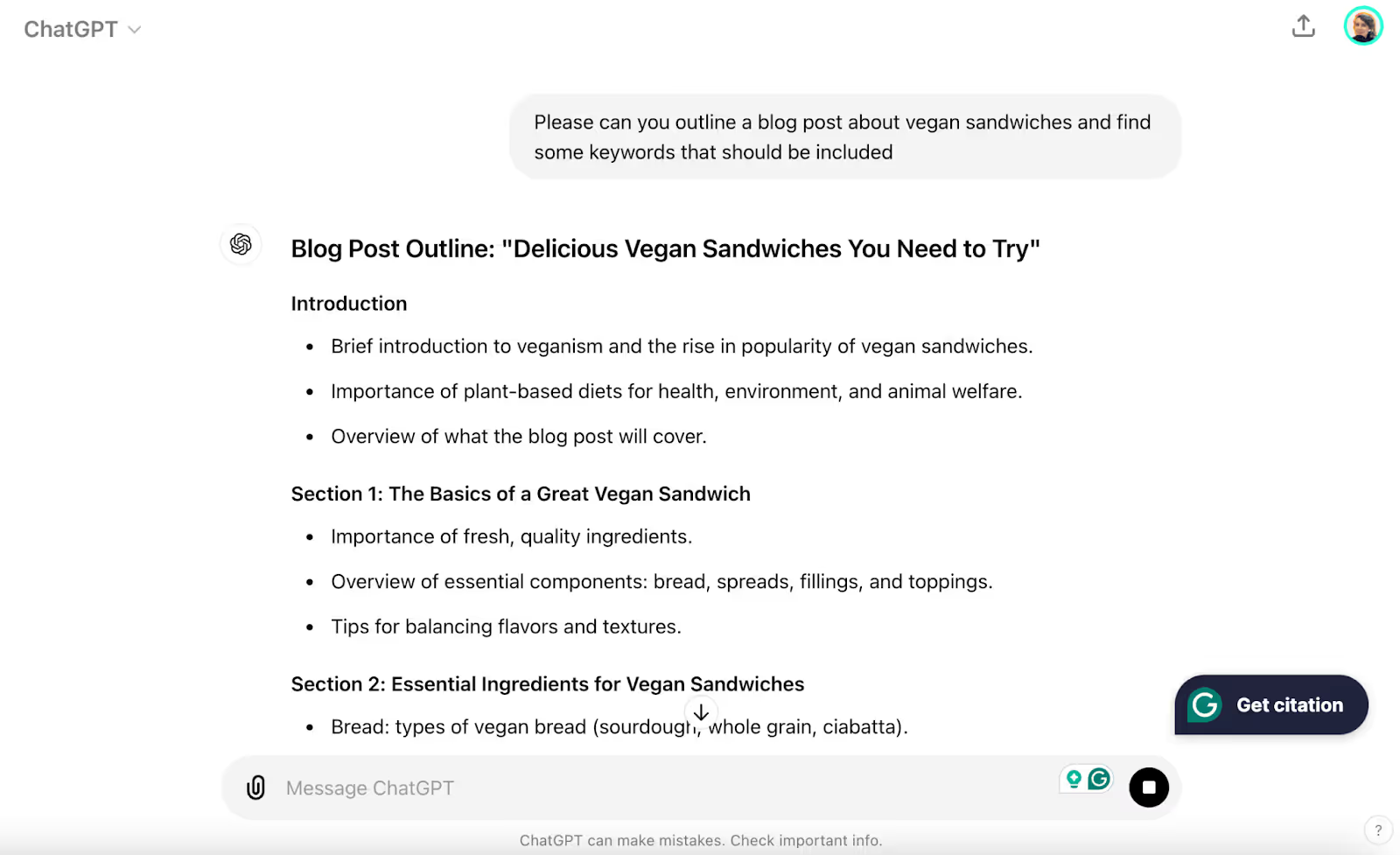
ChatGPT is a tool that helps you write text using artificial intelligence (AI). You ask it questions or give it prompts, and it generates answers or content for you. It wasn’t designed to help optimize content, but it’s useful for outlining articles, answering questions, and brainstorming ideas.
ChatGPT Features vs. Frase Features
- Text generation: Creates content based on the prompts you provide.
- Conversational ability: You can have back-and-forth conversations with it to refine your content.
- Customization: Adjusts the tone and style of the content based on your needs.
- Language Support: Can generate content in multiple languages.
Both ChatGPT and Frase use AI to help create content and generate ideas, but ChatGPT is more focused on interactive conversations and can help with a much wider variety of tasks.
Pros:
ChatGPT does a whole lot more than optimize content (in fact, that’s pretty low on its laundry list of features). It’s good for bouncing around ideas and brainstorming topics you might otherwise have missed.
Cons:
It often needs a lot of guidance to do what you want it to — and honing your prompts can often take longer than doing the task yourself. The quality really varies, too. The output often needs a lot of editing, which can be time-consuming.
How Does Pricing Work?
ChatGPT offers several pricing options:
- Free Plan: Access to basic features with limited usage.
- ChatGPT Plus: $20 per month.
Best For:
Writers, bloggers, and professionals who need help generating ideas and basic content.
Final Thoughts
There are several alternatives to Frase for content optimization, each with its own strengths and focus areas:
- Optimize: Part of a larger SEO toolset. Easy to use with Google Docs integration.
- SurferSEO: Offers real-time content scoring.
- Clearscope: Focuses on readability metrics.
- MarketMuse: Provides in-depth topic research and content strategy tools.
- seoClarity: An all-in-one SEO platform with broader capabilities.
- Content Harmony: Strong competitor analysis and performance tracking.
- Dashword: Offers straightforward, real-time optimization feedback.
- WriterZen: Includes plagiarism checking and topic research.
- Copy.ai: Focused on quick content generation with templates.
- ChatGPT: Versatile for ideation and basic content creation, though not specifically for SEO.
The right tool for you will depend on your needs and circumstances. Larger teams might need a more comprehensive solution like seoClarity or MarketMuse, while small businesses and solo creators might prefer a less expensive, less stacked alternative.
